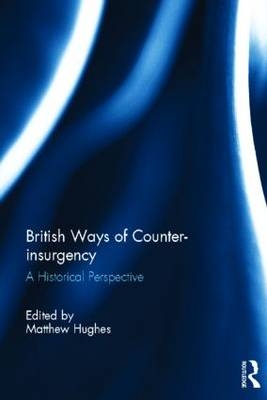
British Ways of Counter-insurgency
Routledge (Verlag)
978-0-415-82577-1 (ISBN)
This book was published as a special issue of Small Wars and Insurgencies.
This edited collection examines the British ‘way’ in counter-insurgency. It brings together and consolidates new scholarship on the counter-insurgency associated with the end of empire, foregrounding a dark and violent history of British imperial rule, one that stretched back to the nineteenth century and continued until the final collapse of the British Empire in the 1960s. The essays gathered in the collection cover the period from the late nineteenth century to the 1960s; they are both empirical and conceptual in tone.
This edited collection pivots on the theme of the nature of the force used by Britain against colonial insurgents. It argues that the violence employed by British security forces in counter-insurgency to maintain imperial rule is best seen from a maximal perspective, contra traditional arguments that the British used minimum force to defeat colonial rebellions. Case studies are drawn from across the British Empire, covering a period of some hundred years, but they concentrate on the savage wars of decolonisation after 1945. The collection includes a historiographical essay and one on the ‘lost’ Hanslope archive by the scholar chosen by the Foreign and Commonwealth Office to manage the release of the papers held.
This book was published as a special issue of Small Wars and Insurgencies.
Matthew Hughes is Chair in History and Head of the Department of Politics and History at Brunel University. Professor Hughes wrote his PhD in War Studies at King's College London. From 2008 to 2010, he held the Major-General Matthew C. Horner Chair at the US Marine Corps University, Quantico, Virginia, sponsored by the U.S. Marine Corps University Foundation. He is currently working on a monograph on the Arab revolt in Palestine, 1936–39, entitled 'The Opaque War: Britain's Pacification of Palestine, 1936–39'.
1. Introduction: British ways of counter-insurgency 2. ‘Savage warfare’: C.E. Callwell, the roots of counter-insurgency, and the nineteenth century context 3. An example to be followed or a warning to be avoided? The British, Boers, and guerrilla warfare, 1900 – 1902 4. Suppressing insurgencies in comparison: the Germans in the Ukraine, 1918, and the British in Mesopotamia, 1920 5. The war on terror that failed: British counter-insurgency in Palestine 1945 – 1947 and the ‘Farran Affair’ 6. Everyone lived in fear: Malaya and the British way of counter-insurgency 7. British abuse and torture in Kenya’s counter-insurgency, 1952 – 1960 8. The British counter-insurgency in Cyprus 9. Nasty not nice: British counter-insurgency doctrine and practice, 1945 – 1967 10. The minimum force debate: contemporary sensibilities meet imperial practice 11. British counter-insurgency: a historiographical reflection 12. Historians, a legacy of suspicion and the ‘migrated archives’
| Verlagsort | London |
|---|---|
| Sprache | englisch |
| Maße | 156 x 234 mm |
| Gewicht | 521 g |
| Themenwelt | Geschichte ► Allgemeine Geschichte ► Neuzeit (bis 1918) |
| Geisteswissenschaften ► Geschichte ► Regional- / Ländergeschichte | |
| Geschichte ► Teilgebiete der Geschichte ► Militärgeschichte | |
| Geschichte ► Teilgebiete der Geschichte ► Wirtschaftsgeschichte | |
| Sozialwissenschaften ► Politik / Verwaltung ► Europäische / Internationale Politik | |
| Sozialwissenschaften ► Soziologie ► Spezielle Soziologien | |
| ISBN-10 | 0-415-82577-6 / 0415825776 |
| ISBN-13 | 978-0-415-82577-1 / 9780415825771 |
| Zustand | Neuware |
| Haben Sie eine Frage zum Produkt? |
aus dem Bereich


